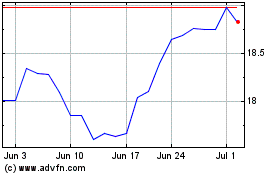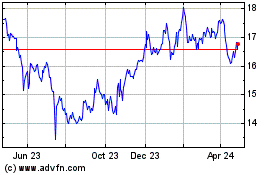By Brent Kendall
AT&T Inc.'s $85.4 billion deal to buy Time Warner Inc. sails
toward two cresting waves of opposition: resurgent antitrust
enforcement in Washington and politicians fired by a new bipartisan
populist rage.
It is too early to know how regulators will treat the
AT&T-Time Warner deal. But after several quiet years, President
Barack Obama's antitrust team has switched into high gear in
response to a recent spurt of deal-making. This trend is likely to
continue in the next administration, as both presidential campaigns
have signaled unease with the AT&T deal and with economic
consolidation more broadly.
Justice Department antitrust enforcers say they have sunk eight
would-be deals over the past year and are currently waging court
fights over three more, including two big health-insurance mergers.
In all, the Justice Department has stopped 43 deals over the past
eight years, more than double the mergers blocked by the preceding
Bush Justice Department.
The Federal Trade Commission, which shares antitrust duties with
Justice, recently waged multiple challenges against hospital
mergers and is considering whether to allow a combination of two of
the country's largest drugstore chains, Walgreens Boots Alliance
Inc. and Rite Aid Corp.
Senate Judiciary Committee Chairman Chuck Grassley (R., Iowa) on
Monday called for a "robust review" of the AT&T deal. Sen.
Patrick Leahy of Vermont, the top Democrat on the committee, said
the panel should hold a hearing on the deal "without delay."
Given the current merger fever, the antitrust views of the next
president's nominees for attorney general, FTC head and Justice
Department antitrust chief are likely to get a lot of
attention.
Democratic presidential nominee Hillary Clinton has sent signals
during the campaign that her administration would be active in
antitrust enforcement.
Republican Donald Trump has said he would not only fight the
AT&T deal, but would also try to unwind a major media merger
previously approved by the Obama team: Comcast Corp.'s 2011
acquisition of NBCUniversal.
The Obama administration came into office promising a new day
for antitrust after what it portrayed as a somnolent Bush era, but
for the first few years its record was hard to distinguish from
that of its predecessors, in part because of a soft deal
market.
That changed sharply last year, and it has continued in 2016 as
many head-turning mergers have been announced. That is especially
true in agriculture, where a trio of large deals, including Bayer
AG's deal for Monsanto Co. and the proposed merger of Dow Chemical
Co. and DuPont Co., have prompted concerns in farm states.
Republicans are often skeptical of government intervention, but
several GOP leaders have raised concerns about industry
concentration, while others have notably refrained from criticizing
the Obama administration.
"I'm afraid that this consolidation wave may have become a
tsunami," Sen. Grassley told agriculture executives at a
congressional hearing last month.
Sen. Mike Lee (R., Utah), chairman of the Senate antitrust
subcommittee, has expressed concern about several mergers,
including the agriculture deals, the AT&T transaction and
brewer Anheuser-Busch InBev NV's takeover of SABMiller PLC.
"The Republican Party is shifting from the party of big business
to the party of populism, and that's a big deal for antitrust,"
said University of Iowa law professor Herbert Hovenkamp. "There's
an inherent suspicion of things that are big, and it's not limited
to big government."
Democratic leaders, for their part, are facing pressure from
fiery figures like Sen. Elizabeth Warren (D., Mass.). "Today in
America, competition is dying," Ms. Warren said in a major
antitrust speech this summer. "Mergers are outrunning
enforcement."
As the economy picks up steam, many companies have made bold
moves to get bigger fast, and that has lit a fire under competition
regulators. But a recent wave of deals shows assertive antitrust
enforcement hasn't deterred companies from testing the waters.
More than five multibillion-dollar deals were announced this
past week, totaling $207 billion in deal volume globally -- and
making it the biggest week since 1999, according to data provider
Dealogic. Beyond the AT&T-Time Warner deal, the data include
British American Tobacco PLC's proposed deal to buy the rest of
Reynolds American.
"The message doesn't seem to have sunk in," said William
Kovacic, a former Republican chairman of the FTC and now a law
professor at George Washington University. "People keep trying to
climb that mountain to higher and higher reaches of
concentration."
Companies that attract a government antitrust lawsuit face
months of uncertainty for their businesses and employees, and often
costly deal termination fees if they lose.
Among the failures in recent months was Halliburton Co.'s
attempt to buy oil-field-services rival Baker Hughes Inc. The
Justice Department sued in April, and officials said the deal was
so problematic it never should have left the boardroom. The
companies abandoned their plans a month later, and Halliburton paid
a $3.5 billion breakup fee to Baker Hughes.
It is unclear whether a similar fate awaits other mergers -- not
just the AT&T deal but Aetna Inc.'s would-be combination with
Humana Inc. and Anthem Inc.'s proposed acquisition of Cigna Corp.
Those two mergers would turn the top five national health insurers
into three giant companies, and the Justice Department sued in July
to block them. Court rulings on both deals are expected in early
2017.
"I was at the agency for 17 years, and I cannot think of another
period where there was this much litigation occurring," said
William Stallings, a former Justice Department antitrust lawyer now
with Mayer Brown LLP.
Enforcers are also voicing more skepticism of "fixes" that
companies may propose to convince the government that competition
will continue after a merger, for example committing to sell some
of their assets to a third party.
In structuring its deal for Time Warner, AT&T showed it has
to some extent learned from its 2011 bid to buy T-Mobile US Inc.,
which was blocked by Washington -- forcing it to pay billions in
breakup fees. This time around, AT&T agreed to a much smaller
fee of just $500 million if the Time Warner deal suffers a similar
fate.
Write to Brent Kendall at brent.kendall@wsj.com
(END) Dow Jones Newswires
October 25, 2016 02:47 ET (06:47 GMT)
Copyright (c) 2016 Dow Jones & Company, Inc.
AT&T (NYSE:T)
Historical Stock Chart
From Mar 2024 to Apr 2024

AT&T (NYSE:T)
Historical Stock Chart
From Apr 2023 to Apr 2024
